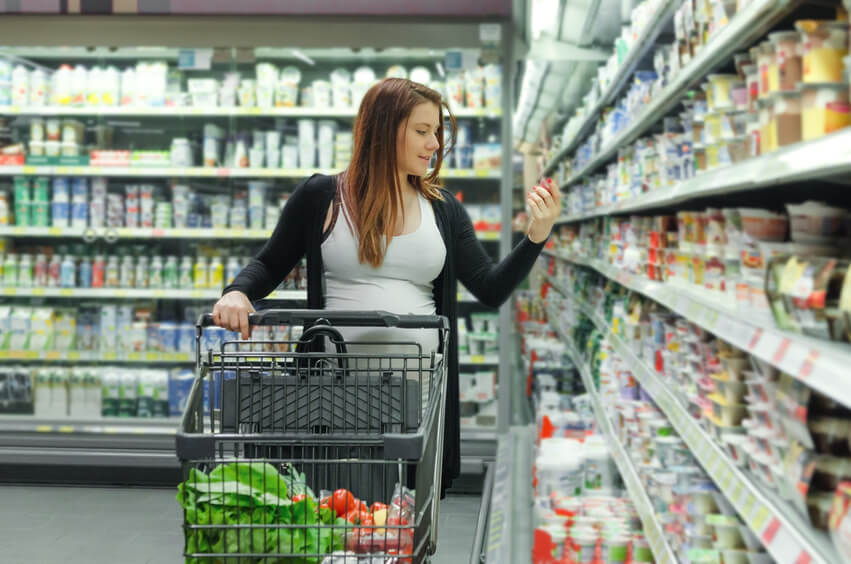Recent unintentional exposure to foodborne illness by local food franchises creates an opportunity to remind women of good food practices. Pregnant women are more likely to get sick from food sources or potentially introduce harmful pathogens to their unborn child because they naturally have a slightly suppressed immune system during pregnancy. The most common causes of illness are related to certain types of higher risk foods and improper food handling practices.
The following represent some common foods to avoid during pregnancy to decrease the risk of foodborne illness.
Hot Dogs & Lunch Meat: bologna, deli meats –
Listeriosis: Listeria monocytogenes is a microorganism that is commonly found in nature; in soil, dust, water, processed foods, raw meats and feces of animals and humans. This rare condition may cause mild flu-like symptoms during pregnancy in the mother but have severe consequences for a developing baby.
Nitrates: nitrates or nitrites found in processed meats or contaminated wells may cause a problem with the development of fetal hemoglobin and a possible link to anemia, pregnancy-induced hypertension (PIH), premature labor, fertility issues, fetal growth problems, neural tube defects or certain cancers.
_________________________
Raw or Undercooked Meat, Poultry, Seafood and Eggs: sushi, oysters, clams, runny eggs, raw cookie dough or cake batter, smoked seafood, refrigerated pates, meats or seafood –
These types of foods may harbor bacteria, viruses or parasites (such as roundworms or tapeworms) all of which are potentially dangerous to an immune-suppressed pregnant woman. Toxoplasmosis is a parasitic infection that may be found in improperly cooked meats or in the feces of cats. It can potentially be passed to the fetus, even if the mother is not ill. (Pregnant women should not be responsible for cleaning the litter box).
_________________________
Unpasteurized Foods, Dairy Products & Juices: soft cheeses (feta, brie, camembert, blue cheese or Roquefort) Mexican style cheeses (queso Blanco, fresco, de Hoja, de crema, asadero, and Panela) –
Pasteurized foods have undergone a heating process to destroy harmful microorganisms (including Toxoplasmosis) without altering the food itself, to make them safe for consumption. Make sure the label on questionable products specifically reads, “made with pasteurized milk.”
The Food and Drug Administration (FDA) requires packaged, unpasteurized juices to be labeled if they have not undergone this pasteurization process.
_________________________
Raw Vegetable Sprouts: alfalfa, clover, radish, and mung bean
or Salads Made in the Store: ham, chicken, egg, tuna, or seafood salad –
These products may carry disease-causing bacteria (such as Salmonella or E. coli) which can cause diarrhea, nausea, abdominal cramping and fever that lasts for several days. Rarely, these infections can be transmitted to the fetus, causing complications at birth.
_________________________
Big Fish: swordfish, shark, king mackerel, tilefish, a limited amount of albacore tuna; caution with fish caught locally –
Fish and seafood are a great addition to a healthy diet full of protein, iron and omega-3 fatty acids. However, big predatory fish may be high in methylmercury, which can harm the developing brain and nervous system in a developing child. Pregnant women are advised to limit consumption of fish to 12 ounces (about two servings) each week.
Check for contamination (bacteria or chemicals) of locally caught fish with the health department or the Environmental Protection Agency’s Fish Advisory website at www.epa.gov/waterscience/fish/states.htm
It is preferable to choose fish from freshwaters (wild) rather than farmed (those raised for food in a commercial facility) to limit chemical or infectious exposure. Polychlorinated biphenyls (PCBs) are carcinogens that may impair memory and learning and have adverse effects on the immune, reproductive and nervous systems. PCBs or other contaminants are more often found in farmed fish. To reduce the amount of PCB exposure, remove the skin and visible fat from fish.
Seafood with the highest amount of DHA and the lowest amount of methylmercury include anchovies, herring, salmon, sardines and trout.
_________________________
Herbal Products:
Foods made with herbs usually have such low doses that they pose little maternal or fetal risk but supplements should be treated like a drug, hence, avoided if possible. Herbal remedies haven’t been well studied and aren’t regulated by the FDA. Therefore, their content, safety or effectiveness are unknown. Herbal supplements may contain less active ingredient than is stated on the label or may contain unwanted substances (like heavy metals, such as lead) that were absorbed by the plant during the growing or processing phases.
Herbs of concern because they may cause uterine stimulation or have detrimental effects on the baby include: devil’s claw, schizandra, licorice, black or blue cohosh, flax oil, papain, large amounts of green tea, oral aloe or sida cordifolia.
_________________________
High Allergy Foods: almost 90% of allergies are caused by milk, eggs, nuts, soy, wheat (& other grains), fish or shellfish –
Early exposure to high allergy foods in the immature newborn immune system may induce an allergy to a food or substance. It is reasonable to avoid these foods during pregnancy and breastfeeding in hopes of sparing your child this same allergy if there is a strong family history of significant allergies.
_________________________
GENERAL COOKING PRINCIPLES
Special attention to clean cooking principles will decrease the chance of foodborne illnesses.
- CLEAN: Wash and/or peel all fruits and vegetables before consuming. Wash hands, surfaces and utensils often.
- SEPARATE: Use separate knives and cutting boards for meats and vegetables to avoid cross-contamination.
- COOK: Use a meat thermometer to evaluate doneness while cooking meats. Do not sample meat until it is cooked appropriately.
- CHILL: Refrigerate foods promptly after eating.
CanyonViewWomensCare.com



